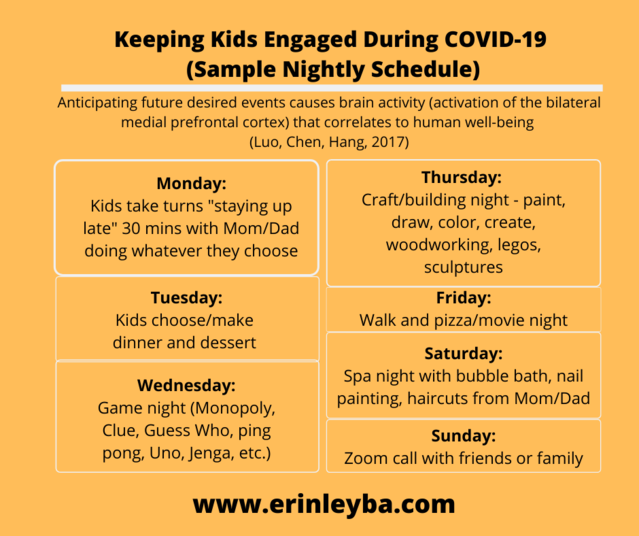Coronavirus Disease 2019
10 Positive Parenting Practices During Coronavirus
Science points to strategies that can help families stay positive amid COVID-19.
Posted April 14, 2020
While the Coronavirus (COVID-19) pandemic offers tremendous challenges to parents, simple practices help families stay calm, positive, and engaged.
1. Draw your attention toward the “good stuff”
While every day is full of both frustrating and magical moments, we choose where we'll focus our gaze. Make it a " daily practice” to focus on the good stuff.
- Use dinnertime to do “pluses” (noting something positive each family member has done that day). (“Plus to Joey for watching his baby sister while I made dinner.” “Plus to Anna for cleaning up her yard toys.” “Plus to Jake for remembering his school Zoom meetings.”)
- Make a “happy board” or a “yes tree” which is writing down “happy moments,” "wins," or bits of progress or positivity that occur each day. ("Jen learned 2 new words!" "Tim shared his cheese stick with his brother" or "Ed washed his hands without being asked.")
- Write your partner and kids a few post-it notes a week thanking them for specific things they’ve done (or write a thank you card to someone outside your family). Research suggests that gratitude can increase happiness, improve relationships, counteract depression, and boost health.
- Follow John Gottman’s evidence-based technique of helping your relationship with your child thrive by engaging in 5 positive interactions for every 1 negative interaction.
2. Post and follow a consistent daily routine as well as a special events calendar
Kids’ usual routines have been profoundly disrupted, if not destroyed, by the pandemic. Establishing new ones can help kids feel safe and act as a “stability anchor” during times of stress. (Studies have also shown that people who grow up with predictable, daily routines are less likely to have time management or attention problems as adults).
In addition to the daily routine, post special, positive events for kids to look forward to. Researchers have found that anticipating future desired events causes brain activity (activation of the bilateral medial prefrontal cortex) that correlates to human well-being.

3. Lower Your Own Stress
Mental health professionals have long argued for parents to “put on their own oxygen masks first” and care for themselves so they can better care for their children. Now it’s even more important because research has shown that the lower your “total parenting stress,” then the less likely it is that stressful life events will cause your children to be anxious.
Time with friends, manicures, a yoga class, an hour to yourself at Target . . . many of the self-care measures we once held dear no longer exist. However, parents need to be creative about "filling their own cups"
- Rest - Go to bed as early as possible, take 5-10 minute breaks throughout the day, and “embrace the pace” (a slow one)
- 3 Things – Put three things on the weekly calendar that you can look forward to – a Zoom catch up with friends, an at-home date night, baking with your child, a morning run
- Positive input – Watch positive or lighthearted news programs – such as “Some Good News” with John Krasinski - to balance the intense heavy news. Limit your time consuming media that make you anxious, sad, or overwhelmed. Purposely watch heartwarming feel-good movies or TV shows
- Scaling question - Borrow a technique from Solution Focused Counseling where you name how stressed you are on a scale from 1-10 (10 being the most stressed), then imagine yourself as 3 points less stressed. What would be happening? What would you be doing differently? What would you do with your extra energy?
4. Re-nature you and your kids
Experts argue that growing numbers of children in the U.S. have become “de-natured.” For example they cite studies that show that a child is six times more likely to play a video game on a typical day than to ride a bike.
However, research suggests that children who have high levels of access to nearby nature are less negatively impacted by life stress. Other studies show that nature provides kids with far-reaching cognitive, emotional, and physical benefits. A meta-analysis of ten studies found that exposure to “green exercise,” or “activity in the presence of nature,” resulted in improvements in self-esteem and mood, with the benefits being even greater in settings with water.
Teachers have long touted the research illustrating that schoolchildren who receive more recess behave better and are likely to learn more. It’s even more important to get kids outside now that much of their learning is being done over screens. Studies compiled by psychiatrist Victoria Dunckley suggests too much screen time makes kids "moody, crazy, and tired."
5. Assign “jobs”
Kids want and need to make meaningful contributions, but they often need structure to succeed. Having roles/jobs helps kids develop skills, feel engaged, develop a sense of identity, practice kindness/caring, and feel a part of a community. Studies also suggest that giving children chores helps them become more well-adjusted, have better relationships with friends and family, and be more successful in their careers.
Parents can make a “job chart” to give kids roles (such as the table-setter, the weed-puller, or the dog-feeder), which provide them with a sense of agency and control over certain tasks at a time when their lives may feel very out of control.
6. Make and check off a daily list of tasks
Research confirms that people who write down their goals accomplish significantly more than those who did not. When you write something down, it has a better chance of being remembered.
Checking things off a list can also be perceived as noting “small successes” which release dopamine, a feel-good neurochemical. The "boost" from dopamine reinforces the behavior of "getting things done." Having children make lists of things they need to do and want to do helps them gain awareness of all they've accomplished.
7. Let them choose some of what they learn
Instead of having children only complete generic worksheets or book pages, help them identify projects or books that relate to their favorite interests, such as the World Cup, the Olympics, pets, or other preferred topics. Self-determination theory and research suggest that when people are able to choose their own goals, they tend to be more persistent, have a more positive affect, and be more engaged in future tasks.
8. Hold space for all kids’ feelings
Kids have lost a ton, just like we have. At times, their sadness may look like boredom, anger, numbness, tiredness, resistance, or frustration. We need to understand the feelings of sadness and loss that are beneath the surface when kids act out, refuse to do an assignment, won’t get out of bed, or don’t want to turn off a video game. Asking kids how they are doing each night before bed and responding with compassion can help.
9. Encourage kids to engage in service
Scientists have found that service or volunteering can have a positive influence on self-reported happiness. Delivering cans to a food pantry, writing cards to elderly family members or helpers such as doctors, nurses, or grocery store clerks, or collecting pop tabs for Ronald McDonald House are some ways kids can get involved.
10. Increase affection and physical touch
Giving hugs to family members may help protect against stress and help them feel supported. Young kids especially need warmth, attention, and physical affection such as reading a book on your lap, friendly roughhousing, a pat on the back, snuggles, and hugs.




